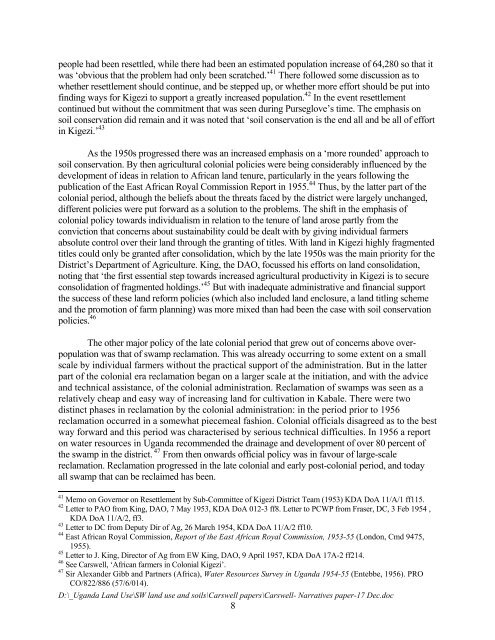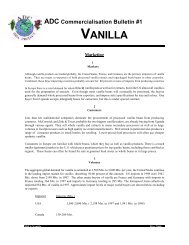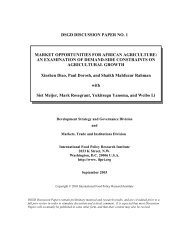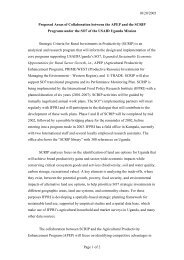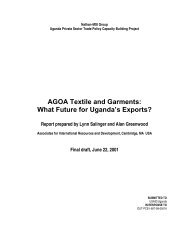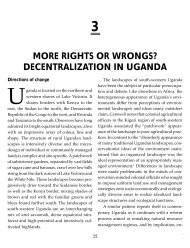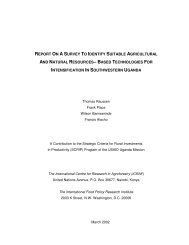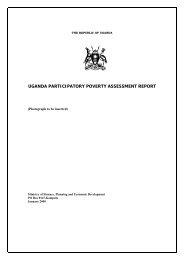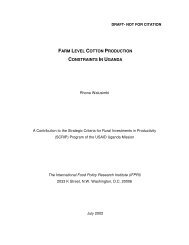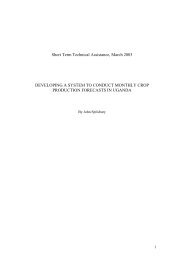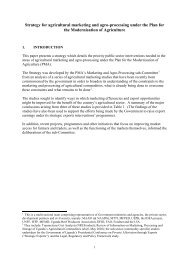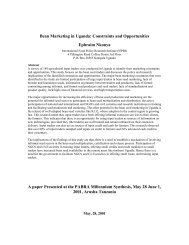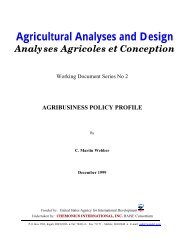Continuities in environmental narratives, Kabale, Uganda ... - Foodnet
Continuities in environmental narratives, Kabale, Uganda ... - Foodnet
Continuities in environmental narratives, Kabale, Uganda ... - Foodnet
You also want an ePaper? Increase the reach of your titles
YUMPU automatically turns print PDFs into web optimized ePapers that Google loves.
people had been resettled, while there had been an estimated population <strong>in</strong>crease of 64,280 so that it<br />
was ‘obvious that the problem had only been scratched.’ 41 There followed some discussion as to<br />
whether resettlement should cont<strong>in</strong>ue, and be stepped up, or whether more effort should be put <strong>in</strong>to<br />
f<strong>in</strong>d<strong>in</strong>g ways for Kigezi to support a greatly <strong>in</strong>creased population. 42 In the event resettlement<br />
cont<strong>in</strong>ued but without the commitment that was seen dur<strong>in</strong>g Purseglove’s time. The emphasis on<br />
soil conservation did rema<strong>in</strong> and it was noted that ‘soil conservation is the end all and be all of effort<br />
<strong>in</strong> Kigezi.’ 43<br />
As the 1950s progressed there was an <strong>in</strong>creased emphasis on a ‘more rounded’ approach to<br />
soil conservation. By then agricultural colonial policies were be<strong>in</strong>g considerably <strong>in</strong>fluenced by the<br />
development of ideas <strong>in</strong> relation to African land tenure, particularly <strong>in</strong> the years follow<strong>in</strong>g the<br />
publication of the East African Royal Commission Report <strong>in</strong> 1955. 44 Thus, by the latter part of the<br />
colonial period, although the beliefs about the threats faced by the district were largely unchanged,<br />
different policies were put forward as a solution to the problems. The shift <strong>in</strong> the emphasis of<br />
colonial policy towards <strong>in</strong>dividualism <strong>in</strong> relation to the tenure of land arose partly from the<br />
conviction that concerns about susta<strong>in</strong>ability could be dealt with by giv<strong>in</strong>g <strong>in</strong>dividual farmers<br />
absolute control over their land through the grant<strong>in</strong>g of titles. With land <strong>in</strong> Kigezi highly fragmented<br />
titles could only be granted after consolidation, which by the late 1950s was the ma<strong>in</strong> priority for the<br />
District’s Department of Agriculture. K<strong>in</strong>g, the DAO, focussed his efforts on land consolidation,<br />
not<strong>in</strong>g that ‘the first essential step towards <strong>in</strong>creased agricultural productivity <strong>in</strong> Kigezi is to secure<br />
consolidation of fragmented hold<strong>in</strong>gs.’ 45 But with <strong>in</strong>adequate adm<strong>in</strong>istrative and f<strong>in</strong>ancial support<br />
the success of these land reform policies (which also <strong>in</strong>cluded land enclosure, a land titl<strong>in</strong>g scheme<br />
and the promotion of farm plann<strong>in</strong>g) was more mixed than had been the case with soil conservation<br />
policies. 46<br />
The other major policy of the late colonial period that grew out of concerns above overpopulation<br />
was that of swamp reclamation. This was already occurr<strong>in</strong>g to some extent on a small<br />
scale by <strong>in</strong>dividual farmers without the practical support of the adm<strong>in</strong>istration. But <strong>in</strong> the latter<br />
part of the colonial era reclamation began on a larger scale at the <strong>in</strong>itiation, and with the advice<br />
and technical assistance, of the colonial adm<strong>in</strong>istration. Reclamation of swamps was seen as a<br />
relatively cheap and easy way of <strong>in</strong>creas<strong>in</strong>g land for cultivation <strong>in</strong> <strong>Kabale</strong>. There were two<br />
dist<strong>in</strong>ct phases <strong>in</strong> reclamation by the colonial adm<strong>in</strong>istration: <strong>in</strong> the period prior to 1956<br />
reclamation occurred <strong>in</strong> a somewhat piecemeal fashion. Colonial officials disagreed as to the best<br />
way forward and this period was characterised by serious technical difficulties. In 1956 a report<br />
on water resources <strong>in</strong> <strong>Uganda</strong> recommended the dra<strong>in</strong>age and development of over 80 percent of<br />
the swamp <strong>in</strong> the district. 47 From then onwards official policy was <strong>in</strong> favour of large-scale<br />
reclamation. Reclamation progressed <strong>in</strong> the late colonial and early post-colonial period, and today<br />
all swamp that can be reclaimed has been.<br />
41 Memo on Governor on Resettlement by Sub-Committee of Kigezi District Team (1953) KDA DoA 11/A/1 ff115.<br />
42 Letter to PAO from K<strong>in</strong>g, DAO, 7 May 1953, KDA DoA 012-3 ff8. Letter to PCWP from Fraser, DC, 3 Feb 1954 ,<br />
KDA DoA 11/A/2, ff3.<br />
43 Letter to DC from Deputy Dir of Ag, 26 March 1954, KDA DoA 11/A/2 ff10.<br />
44 East African Royal Commission, Report of the East African Royal Commission, 1953-55 (London, Cmd 9475,<br />
1955).<br />
45 Letter to J. K<strong>in</strong>g, Director of Ag from EW K<strong>in</strong>g, DAO, 9 April 1957, KDA DoA 17A-2 ff214.<br />
46 See Carswell, ‘African farmers <strong>in</strong> Colonial Kigezi’.<br />
47 Sir Alexander Gibb and Partners (Africa), Water Resources Survey <strong>in</strong> <strong>Uganda</strong> 1954-55 (Entebbe, 1956). PRO<br />
CO/822/886 (57/6/014).<br />
D:\_<strong>Uganda</strong> Land Use\SW land use and soils\Carswell papers\Carswell- Narratives paper-17 Dec.doc<br />
8


